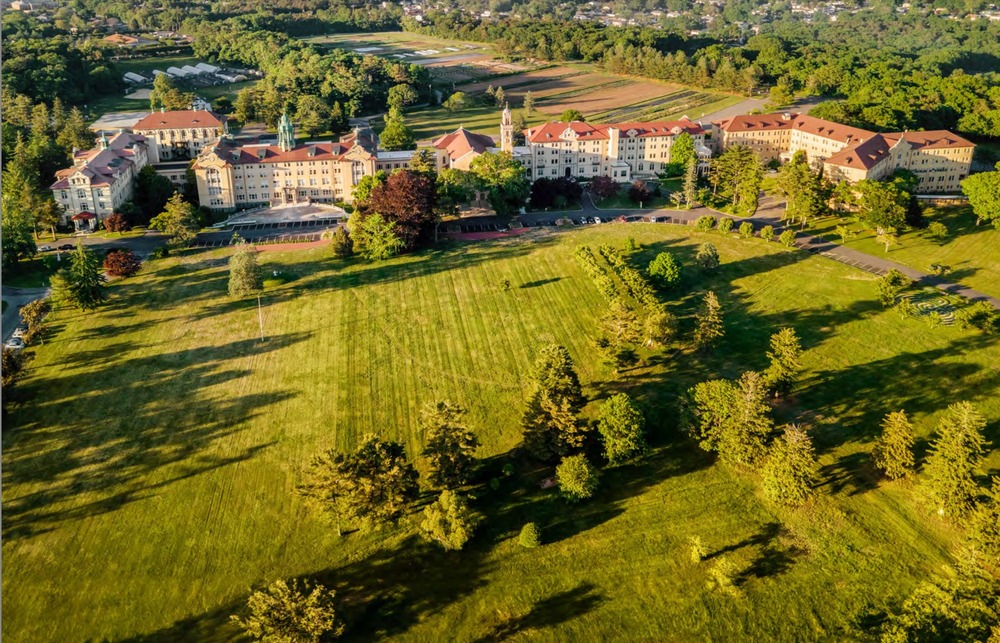
This is an undated aerial view photo of Sisters of St. Joseph 220-acre motherhouse property in Brentwood, N.Y. (OSV News/courtesy Sisters of St. Joseph)
Green nuns. Green sisters. Even "eco-nuns."
Throughout America — and indeed, the world — thousands of religious sisters are daily witnessing to the environmental care commitment urged by Pope Francis' 2015 encyclical, Laudato Si', and its 2023 sequel, Laudate Deum. It's a congregational concern that, for many of them, often predates the pontiff's writings — but the merging of their own environmental priorities with official papal pronouncements has helpfully amplified sisterly endeavors.
Highlighting the Season of Creation — the five weeks between the World Day of Prayer for the Care of Creation (Sept. 1) and the feast of St. Francis of Assisi (Oct. 4) — OSV News spoke with some eco-minded congregations of women religious.
"Where others may philosophize and talk a good game, sisters are about the actual practical doing and walking the walk. Sisters get things done," observed Sarah McFarland Taylor, author of "Green Sisters: A Spiritual Ecology" (Harvard University Press), and an associate professor in the Department of Religious Studies and the Program in Environmental Policy and Culture at Northwestern University in Evanston, Illinois.
"When schools were needed, they (the sisters) built schools. When hospitals were needed, they built hospitals. When nurses were needed, they rolled up their sleeves and served, even braving frontline battles to tend the wounded," McFarland said. "Now, amidst our climate crisis, sisters are attending to God's family where they are needed most."
That includes embracing webinar technology to get the word out — as the Sisters of St. Joseph of Brentwood, New York, are doing with their support of a five-part online seminar series called "Climate: The New Catholic Imperative" from Spirit Alive: The CSJ Institute for Faith Inquiry and Education.
"We want people to understand what the church teaches — and we want them to see the theological foundation for what we, as sisters, are doing," Sister Maria Pascuzzi, director of Spirit Alive, told OSV News. "It's not like a new fad, that we're getting on the bandwagon — we believe that everything that exists was given to us by God, not for our domination, but for our care and supervision."
At their 212-acre motherhouse property in Brentwood, New York, on Long Island, the sisters have leased land to farmers — permitted to use only organic farming practices — who sell their produce to the local community. The motherhouse also features one of the largest solar arrays in the area, as well as water treatment facilities. A garden ministry has expanded over the years, adding animals and children's courses.
"Just typical things," Pascuzzi said, "that make the world a better place, and are signs that we're caring for creation — or at least don't want to see any more degradation of the beauty of the created order."
While the sisters — as a congregation — may have more resources than individuals, their example nonetheless has been inspiring others to look at what they can do.
"We want to encourage people, in the dailiness of their lives, to take single actions that will help. It's just as important that you in your house conserve water and are mindful of recycling, as it is for my congregation to do the things it can do," Pascuzzi said. "Everybody can do something."
Advertisement
For the Sisters of St. Francis of Mary Immaculate in Joliet, Illinois, simply landing on their homepage is a clear indication of their priorities: "Our Earth. Our Responsibility," a slide proclaims, illustrated with a translucent globe.
"We heard the pope's invitation. We heard the call," said Sister Peggy Quinn, who is both the order's vocations director and a local coordinator of her congregation's Justice, Peace, and Integrity of Creation Commission.
"There are some dioceses where you don't hear it in the parishes. The pope has asked us to look at it. If you read the document," Quinn said, speaking of Laudato Si'. "If you don't respond to that," she added, her voice trailing off in disbelief. "It's our Earth. It's our existence."
The sisters created a plan based on the Laudato Si' Action Platform — an initiative of the Vatican inspired by Pope Francis' encyclical — with tasks from 2023-2025 linked to various congregational and public goals: offering Earth Day events; posting resources on their website; brainstorming on how the poor are impacted by climate change; embracing intentional recycling; and more.
They also hope to re-launch a local Earth-focused festival — Bluestem Earth Festival, named after a grass native to Illinois — that saw great community success, drawing up to 1,000 guests and 100 vendors to the University of St. Francis in Joliet.
"Even in the discord in the world, the peacemakers of Francis — that's where we want to shine," Quinn reflected.
Echoing Quinn's assertion, Sister Catherine Darcy, justice resource manager of the Mercy Justice Team for the Sisters of Mercy of the Americas, said wider public awareness of Laudato Si' and the climate crisis is an ongoing concern.
"I don't know that you hear enough about it in parishes," Darcy said, "but among religious women ... it's a high priority."
As to why women religious are so attuned to environmental issues, Darcy has a theory.
"Many religious congregations were founded to serve people suffering from poverty," she said. "I think it's the link between seeing what the degradation of Earth is doing to people who suffer from poverty. I think they have a special eye for that."
Their life of prayer also contributes to a specific outlook.
"I think the contemplation of religious brings us to a different space in terms of environment," Darcy suggested. "To realize how integral God is in our lives, and that the destruction is really in opposition to God."
The Sisters of Mercy also participate in the Laudato Si' Action Platform, and have hired laypeople to work with them on systemic change — such as federal legislation, sustainability of their facilities (including solar energy) and processes, and management of their investments.
They are also significantly reducing plastic usage and collaborating with both faith-based and secular environmental coalitions.
Cooperation, said Darcy, is critical.
"We're learning from others. The interfaith and the secular coalitions that are working on this — that's the key," she emphasized. "You can't do it by yourself. You have to join with others."
Ultimately, all the sisters told OSV News they hope awareness of Francis' urgent environmental message — and a corresponding response — will continue to escalate among the faithful.
"We want them to understand that this is something that is rooted in our tradition," Pascuzzi said. "It's not a 'woke' thing at all. It's a Catholic thing."






